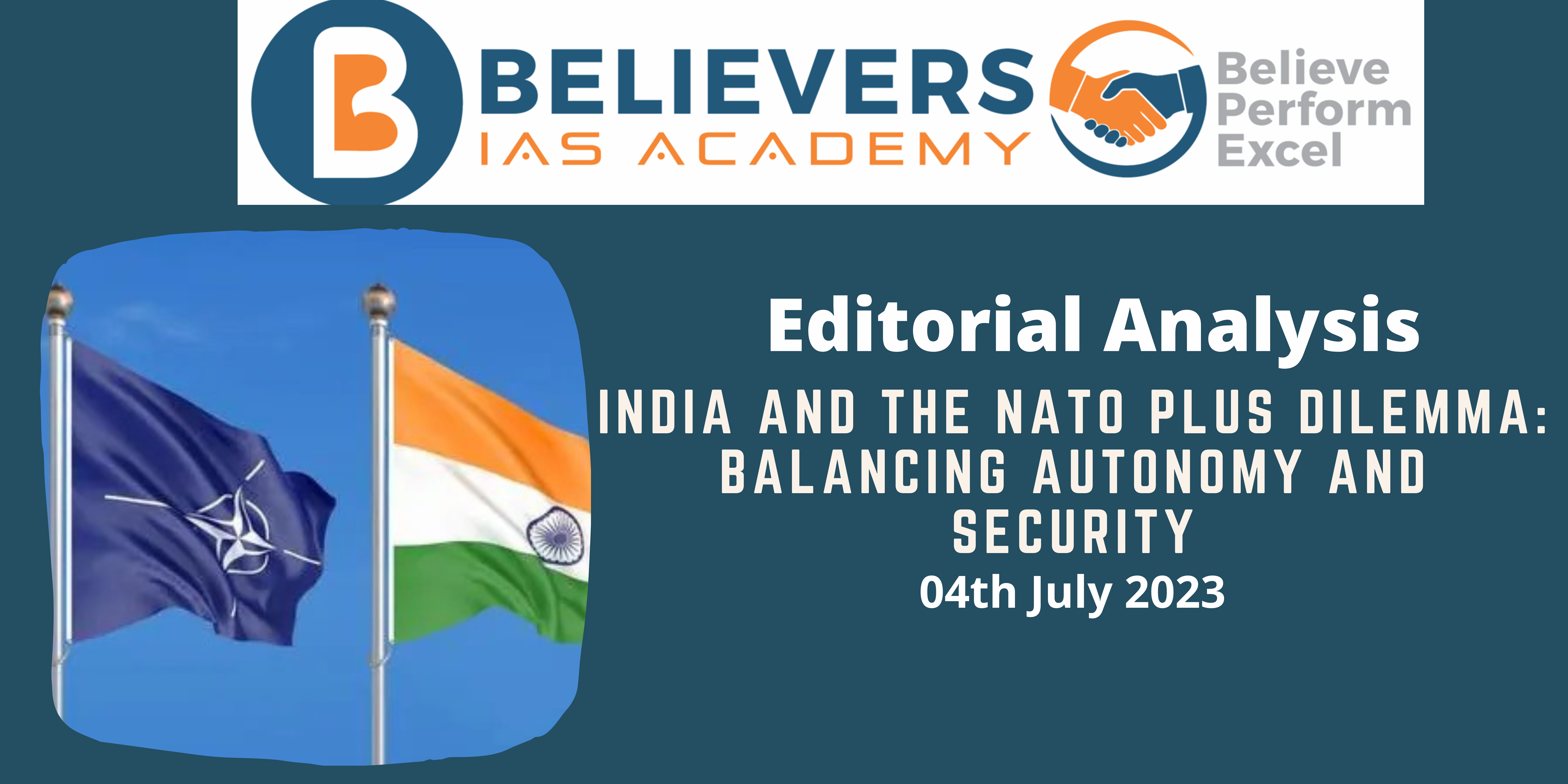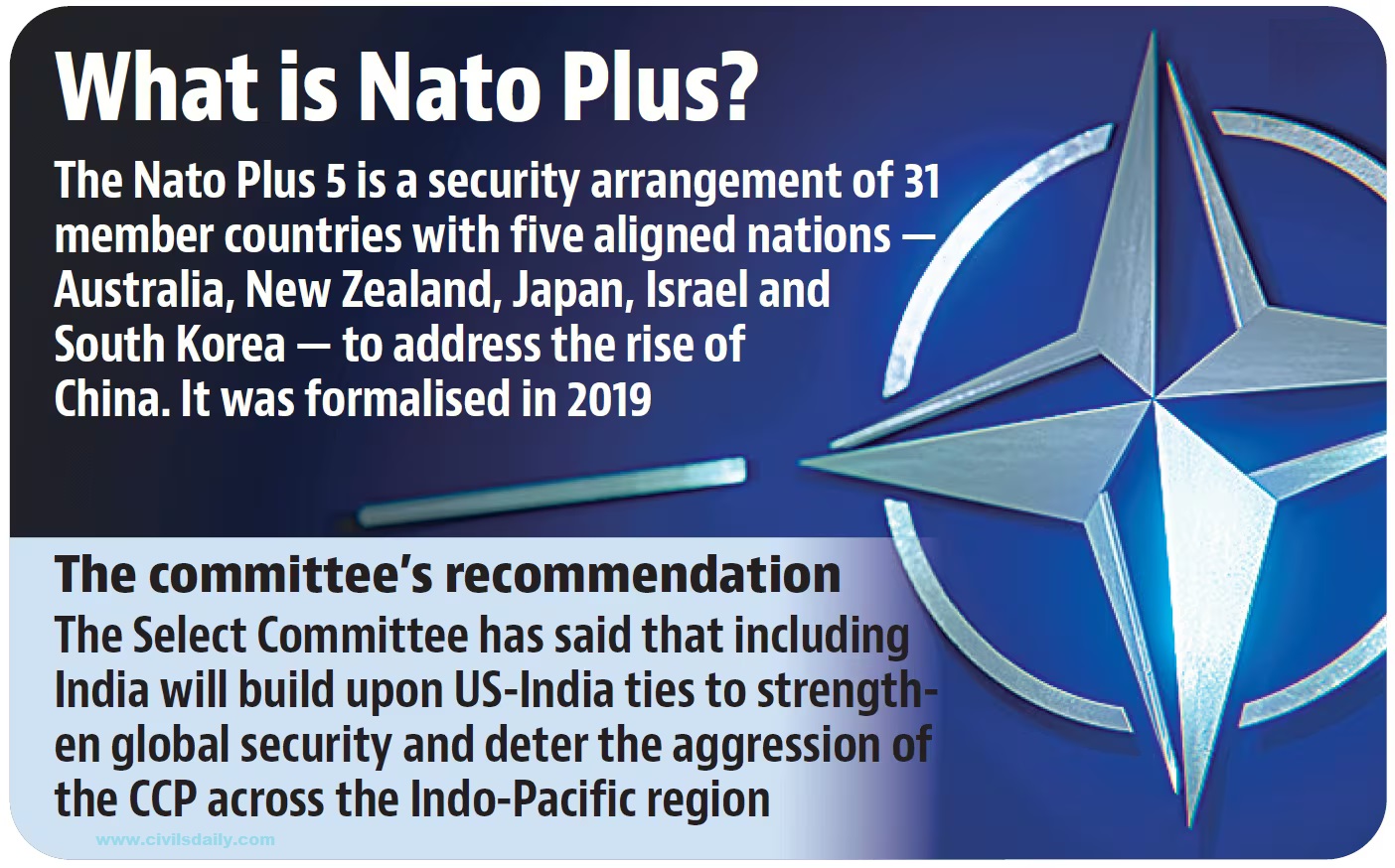India and the NATO Plus Dilemma: Balancing Autonomy and Security
Context:
The recent discussions surrounding India’s potential inclusion in the NATO Plus framework—that aims to bolster global defense cooperation and counter the strategic competition posed by the Chinese Communist Party. The article explores the implications of India’s participation in NATO Plus, examining its benefits, geopolitical challenges, and the impact on India’s longstanding policy of strategic autonomy.
Relevance:
GS-02 (Bilateral Grouping and Agreements)
Prelims:
- NATO, Soviet Union
Mains Questions.
Analyze the impact of India’s potential entry into NATO Plus on its longstanding policy of strategic autonomy, taking into account the interests of neighboring countries and regional organizations. (150 words)
What is NATO?
- The NATO-India Political Dialogue is a series of discussions and meetings between India and the North Atlantic Treaty Organisation (NATO).
- The first political dialogue between India and NATO took place in Brussels on December 12, 2019.
- The dialogue holds significance as NATO has been engaging in bilateral dialogues with both China and Pakistan.
- By engaging in a political dialogue with NATO, India aims to influence and shape NATO’s understanding of various regions and issues important to India.
- The dialogue provides India with an opportunity to present a balanced perspective to NATO regarding the situation in different regions.
- Both India and NATO share similar viewpoints on key matters such as China, terrorism, and Afghanistan.
- The dialogue allows India to address concerns about Pakistan’s role in Afghanistan, aligning with NATO’s interests in the region.
- India’s participation in the NATO dialogue enhances its diplomatic engagement and strengthens its ties with NATO member states.
- The dialogue facilitates the exchange of information, analysis, and strategic viewpoints between India and NATO.
- The NATO-India Political Dialogue contributes to fostering mutual understanding, cooperation, and collaboration on shared security challenges and objectives.
Dimensions of the Article:
- NATO and NATO Plus: Unraveling the Frameworks
- India’s Prospective Role in NATO Plus: Weighing the Advantages and Challenges
- India’s Priorities: Regional Dynamics and the Quad
NATO and NATO Plus: Unraveling the Frameworks.
NATO, originally formed as a transatlantic military alliance, has defied expectations and expanded its membership even after the Cold War era. Its significance has been reinforced by recent geopolitical tensions and conflicts, with Russia’s actions in Ukraine raising concerns about a new Cold War. Meanwhile, the concept of NATO Plus, an informal extension of NATO, envisions the inclusion of five U.S. treaty allies—Australia, New Zealand, Japan, Israel, and South Korea—for enhancing global defense cooperation and countering the influence of the Chinese Communist Party.
India’s Prospective Role in NATO Plus: Weighing the Advantages and Challenges.
Security Benefits and Access to Advanced Technologies:
- By joining NATO Plus, India could potentially secure a much-needed security umbrella, providing protection and deterrence against emerging threats in the region.
- Moreover, membership might facilitate access to advanced military technologies, intelligence-sharing mechanisms, and interoperability with other member-states.
- This could bolster India’s defense capabilities and modernization endeavors, strengthening its position in the evolving geopolitical landscape.
The Balancing Act: Navigating Ties with Russia and China:
- However, India must cautiously navigate its relationship with Russia and China, both key players in the region. While NATO Plus membership might strain India’s robust strategic partnership with Russia, it could also lead to heightened tensions with China.
- Given the delicate balancing act India has traditionally practiced, managing geopolitical consequences would be an arduous task.
Preserving Strategic Autonomy and Flexibility:
- India’s long-standing policy of strategic autonomy has allowed it to engage with various nations and blocs based on its interests. By joining a NATO framework, India may be required to align its defense and security policies with the alliance’s objectives, potentially limiting its flexibility in dealing with other regional powers.
- This could lead to strained relationships with neighboring countries and regional organizations, undermining India’s independent stance.
India’s Priorities: Regional Dynamics and the Quad
India’s immediate focus should remain on addressing its unique set of regional security challenges, such as border disputes, terrorism, and conflicts. While NATO has competencies to tackle such issues, its broader geopolitical agenda spanning from Eurasia to the Indo-Pacific may divert attention and resources away from India’s pressing concerns. At present, India’s engagement through the Quad—comprising India, Japan, Australia, and the U.S.—holds promise as a viable alternative to the NATO Plus proposition, though China’s influence looms large in the region.
Way Forward
Given the complexities and potential implications, India must carefully deliberate its decision regarding NATO Plus. Prioritizing its security interests while safeguarding strategic autonomy is paramount. Consultations with key stakeholders, including Russia, China, neighboring countries, and regional organizations, are necessary to gauge their concerns and assess the viability of alternative frameworks like the Quad.
Conclusion
The question of India’s potential inclusion in the NATO Plus framework sparks a heated debate regarding the delicate balance between security imperatives and the preservation of strategic autonomy. While the allure of enhanced defense capabilities and cooperation is tempting, India must evaluate the far-reaching consequences on its geopolitical relationships, regional dynamics, and independent foreign policy. As India stands at this crossroad, navigating the terrain with prudence and foresight will be crucial in securing its long-term interests while fostering stability in the Indo-Pacific region.




